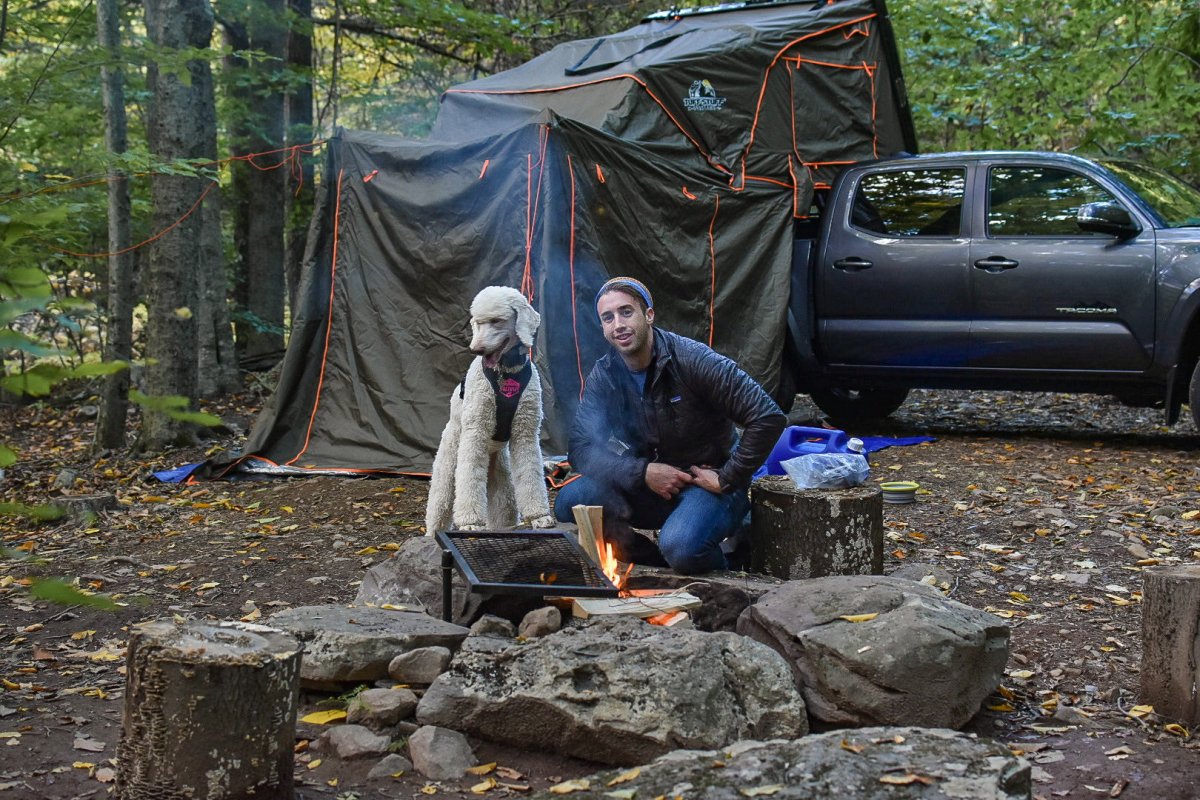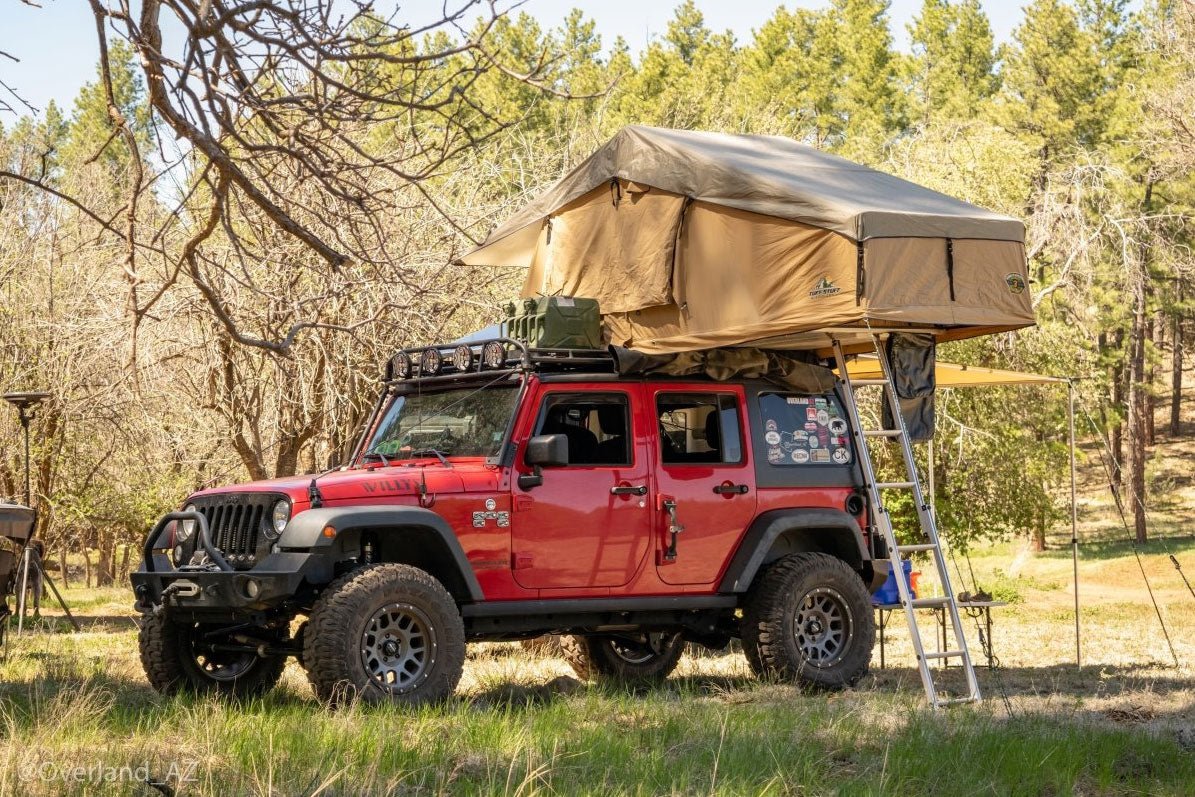Overlanding and camping are two terms that often pop up in conversations concerning exploring nature. Although these two terms describe activities that will otherwise look identical to a person new to the outdoor camping scene, they represent two entirely different travel styles and scopes.
Overlanding and camping have their unique quirks and similarities, and knowing how to tell the difference between both is the trick to fully understanding the concept behind these terms. In this article, you will learn all you need to know about camping and overlanding experiences.

Overlanding Vs. Camping
Overlanding and camping are two great ways to experience the outdoors. Both activities involve abandoning the comfort and convenience of the daily lifestyle and life as you know it to adopt a more nomadic way of life for a certain period.
At first glance, it is easy to see why anyone will mistake overlanding for camping and vice versa. Both involve stocking up on survival gear to advance into the wilderness, where you will have limited contact with civilization and have to find different ways to adapt to normal routines.
However, with an in-depth look at the factors that entail both terms, you will learn that many key differences set the two apart.
An overlander is a camper, but a camper is not an overlander.
Sounds tricky, right? After all, both involve setting up camp and sleeping beneath the stars. Regardless of this similarity, camping and overlanding are two different concepts.
What Is Overlanding?
Overlanding is a self-reliant, vehicle-based on-road and off-road travel to remote locations. It is a journey of resilience and adventure where the focus and enjoyment are not on the destination but the trip itself.
Although it has been thought to have existed for quite some time, overlanding has only recently started to be recognized as a mainstream movement and pop up on the camping scene due to the growing popularity surrounding the term.
The earliest record of what is considered a part of overland history originated in Australia. In the early 1900s, between 1906 and 1910, Australia opened a route for the sole purpose of herding cattle for long-distance travel.
These routes were used for trading farm animals and traders accompanied farm animals, probably on foot, to finalize these deals. Although modern overlanding has nothing to do with animals, this period is thought to have pioneered what has now evolved into present-day overlanding.
Overlanding is a journey of survival that will test anyone’s sense of will. It requires the traveler to be self-dependent on limited resources while going off-grid to explore the wilderness that the average camper probably never even dreams of visiting on the weekend.
Put simply, Overlanding is a journey traveled in resilient mechanized off-road vehicles into remote locations for an extended period which can last anywhere from weeks to years.
Overlanding is a journey that spans several international territories through rough terrain, conquering obstacles of exploring and enjoying nature.
The trip's value is not arriving at a site to set up camp and enjoy roasted marshmallows. The joy lies in traveling unknown trails and exploring the gifts of nature.
What Is Camping?
When you think about camping, you envision a quaint little trip with your family to a picturesque location where you can enjoy the outdoors for a few days before returning home.
Camping is a time for people to relax and explore the outdoors, usually dedicating time to enjoying nature in one area. Camping trips are fun recreational activities to escape urban life for a more natural environment for a limited time.
The umbrella term ‘camping’ is often loosely thrown around. Still, it can only be defined in one true scope, which is a recreational activity devoted to relaxation and exploring life outdoors.
Camping can be done in different ways. Campers can be involved in tent camping, backpacking, survivalist camping, van camping, or glamping. Each term defines different camping techniques depending on preferences, purpose, and comfort levels.
When people camp, they often do so in designated camping areas in tents or recreational vehicles. Depending on the area and facilities available, campers will either be provided with facilities like bathrooms and kitchen equipment during their stay or have to make do with limited resources to navigate normal activities.
If the latter is the case, the camping style is known as boondocking or dispersed camping. Campers usually indulge in activities like hiking, fishing, kayaking, bird-watching, and other activities to enjoy an outdoor experience.

Differences Between Camping And Overlanding
Camping and Overlanding both denote a scope that involves abandoning the hustle of urban life in pursuit of something more natural.
Both terms are often used synonymous, especially since they involve a person temporarily habiting outdoors and using limited resources to survive. Although they are both ways to enjoy quality time outdoors- with or without company- camping and overlanding are two aspects of different spectrums.
1. Purpose
Camping
The sole purpose and reason behind camping trips are to have fun, relax, and explore a particular location in nature.
When people plan camping trips, they usually have a destination in mind. This destination might be a pristine lakeside nature reserve or a trip to a mountaintop plateau.
Regardless of the location they choose, campers already have everything thought out. They have already figured out the area they wish to explore, the duration of their trip, and even sometimes the activities they will participate in.
In camping, the journey to the campsite is fun, but that is not the joy of the trip. The pleasure and whole point of the trip is the location itself and the activities waiting for the campers.
Camping trips are usually made in social groups. This can be as a family vacation, with one partner, or one of those trips you order with nature reserves.
On camping trips, campers set up semi-permanent shelters, which they return to at night after exploring activities in the area or nearby areas.
Overlanding
In overlanding, several concepts parallel the basic camping concept. However, the essential difference between overlanding and camping lies in the purpose of the expenditure, which is the journey itself.
When you choose camping, you have only one destination in mind. With overlanding, the destination is not the purpose of the trip, but the experience enjoyed to reach that location that is miles away.
Overlanding is a survivalist expenditure journey where the camper aims to enjoy the natural beauty of the off-roads, challenging terrains, and the raw, untouched beauty that surrounds them.
Admittedly, both activities involve setting up a tent outdoors every night. However, with overlanding, the aim is not to arrive at a lake reserve, pitch a tent, and take a hike only to return to the tent at night. The joy of the trip is to make a long drive, set up camp, and continue the journey onwards.
Overlanding isn't just a trip. It is a lifestyle that involves maneuvering a 4WD and depending on your overland vehicle to travel over any terrain you might encounter.
Although overlanding is a chance to explore nature, it is better to embark on the expenditure alone and without out
2. Time
Camping
Camping trips are usually short. They extend for a few days, and on these days, the campers typically settle in one area.
Camping is a leisurely activity considered a vacation. On the trips, the campers never abandon their urban life for more than a few days. Instead, these trips are planned as a short break from their normal lifestyle to satiate their need to reconnect with nature.
Overlanding
With Overlanding, the story is very different.
When you choose to go overlanding, you decide to venture into the wilderness often for an unknown period. Overlanders can spend weeks, months, or even years exploring the areas across different terrains and often into different states.
Overland campers are always away from home longer than the average camper. An overland camper’s trip is split into what looks like an unending cycle of setting camp in different places and barely for more than a few days at a time.
3. Resources And Facilities
Camping
The availability of essential resources and facilities depends on where a camper chooses. No rule provides a one-size-fits-all account of what the average campers' facilities are like. There are different camping spots, and the facilities available in each camping spot often vary wildly.
However, the availability of resources and facilities depends on if the camper chooses to set up camp on a frontcountry, backcountry/designated, or dispersed campsite.
Frontcountry camping grounds offer campers the luxury resources and facilities they are used to in urban settings in exchange for a fee. These campsites have running water, restrooms, showers, trash disposal facilities, and electricity. Individual camps usually offer picnic tables, fire fings, tent space, and parking.
Frontcountry campsites are often owned by Federal, State, or Private agencies. They are often used by campers who seek a vacation in nature without any necessary discomfort.
Designated campsites often charge a considerably cheaper fee but lack the convenience a front-country campsite offers. They are often secluded without amenities like electricity or running water systems. These campsites often offer vault toilets, fire rings, and picnic tables, but rarely anything more.
When campers choose to use dispersed campsites, they decide to boondock with extremely limited amenities. While these sites are often free, the availability of amenities is usually limited to public toilets and fire pits. Sometimes, dispersed campsites offer nothing but tent pads.
Overlanding
Although campers have options for where to set up camp and in what condition, overlanders take what they get. All you can do as an overland camper is to prepare for the worst and ride it out.
Going Overlanding means you do not get access to resources the average camper will enjoy. This leaves you to come up with substitutes for these resources.
For example, you do not get bathrooms or toilets on overlanding trips. You will have to make the most of your gear to create makeshift solutions for these processes.
4. Planning Process
Because overlanding and camping involve different scopes, they require different planning methods.
Admittedly, campers and overlanders indulge in similar activities. Depending on the type of camping trip, some campers and overlanders perform similar activities that involve using limited resources for survival. Like overlanders, some campers sleep in tents and go to the bathroom in the wild. However, the methods of preparing for these activities are different.
Camping
When planning your camping trip, you need enough resources to last your planned duration in the location you are traveling to. This means you have to prepare for the camping location, the activities you will indulge in while at the site, and enough gear that will facilitate a successful camping trip.
Because you already have a location in mind, it is easier to plan what gear you will need to carry out specific actions in that location. Are you going to be in a camp that already provides facilities like bathrooms and firepits? Or will you be on a campground where you must figure out the essentials from scratch?
If you already have an RV, you already have most of your essential gears mapped out and provided for you.
Overlanding
Planning your overland trip is a more intricate and complicated process.
There are a lot of unknown variables when dealing with an overland trip. Short of having a general idea of where you wish to go, you have nothing else definite and set in stone. All you know is the routes of the area you are headed.
Because you do not have any other features to prepare with, your best bet at a planning method is to understand the weather and terrain in the areas you will be in. This will help you prepare for the worst.
Since nothing is known for sure, you have to prepare for different scenarios. You will need to plan your food, water, and even clothing to accommodate all the variables so you will not be stuck in a messy situation.
Essentially, where camping features a definite panning process, overlanding involves more variables you need to account for.
5. Gear
The type of gear you need when going camping is significantly different from the gear you need for an overland trip.
As previously mentioned, when you go camping, you already know what to prepare for. Depending on the area you choose to set up camp in, you already probably have access to electricity, gas, grills, and other essentials. This means you only have to pack temperature-appropriate clothing and other basic appliances.
When going overlanding, you have more to prepare for. Hence, you need more gear. This can be tricky, especially since you have limited vehicle space.
On your overlanding trip, you will be away from the typical urban setting. This means you will not have access to basic amenities for a long time, reading you to substitute these amenities for mobile gear. You will need to pack everything for your overlanding trip, from a camping stove to fuel, bedding and clothing essentials, enough food that can be preserved without refrigeration (for obvious reasons), water, and everything in between.
You will be held accountable for your survival, and you will need to make the most of the gear you bring along. Other than the essentials, you also need to bring along gear for your vehicle.
An overland trip is vehicle-specific, and you will be on the road a lot. Bringing gear for your vehicle will ensure you can get your vehicle out of any sticky situation. From vehicle recovery kits to maps, fire extinguishers, air tools, and an extra tire, you must ensure you have everything your vehicle might need.
Ultimately, you only need the necessities on your camping trip and full survival gear for your overland trip.
Knowing The Difference
Camping and overlanding might seem very similar at first. However, with an in-depth look, it is easy to see that these concepts are parallels.
Where overlanding features careful planning to figure out the best way to best the challenges nature might throw at you on your journey of discovery, camping is a more mundane and leisurely activity.
Regardless of these differences, both activities are fun ways to explore nature and enjoy visiting new places.



